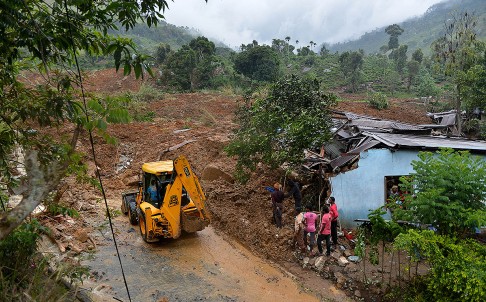Sri Lankan tea plantation workers and families buried alive by mudslide
About 300 missing as heavy rain triggers what may be nation's worst disaster since 2004 tsunami
PUBLISHED : Wednesday, 29 October, 2014, 9:22pm
UPDATED : Thursday, 30 October, 2014, 1:06am
Agencies in Colombo

Residents stand outside a damaged building at the site of a landslide caused by heavy monsoon rains in Koslanda village, central Sri Lanka. Photo: AFP
About 300 people are feared buried alive after monsoon rains triggered a landslide at a Sri Lankan tea estate, in what could be the nation's worst natural disaster since the 2004 tsunami that killed more than 30,000.
The landslides hit a well-known tea plantation east of Colombo early yesterday, with some homes buried in nine metres of m&d, officials said. About 100 people are known to have died and hundreds of others are missing. Most of them were at school or work.
Soldiers were trying to dig through debris for survivors, but the rescue was hampered by damage to roads which blocked earth-moving and other heavy equipment from arriving.
"We have reports of 140 houses getting washed away in the mudslides," Sarath Kumara, a spokesman for the Disaster Management Centre (DMC), said.
"The latest we have got is that at least 300 people may be missing," the official said, updating an earlier estimate of 200.
Children who left for school in the morning returned to find their houses in Haldummulla in the Badulla district, 192km from the capital, had been buried.
The victims were tea plantation workers and their families, whose homes were located on a mountain slope that came crashing down.
Villagers had been advised to move away because of the threat of a landslide, but many did not heed the warning.
"I was under the rubble and some people took me out ... my mother and aunt died," a woman being treated for injuries said.
"We saw smoke around the area. Some people shouted and asked us to run away, so we ran," another survivor said
The top military official in the area, Major General Mano Perera, said about 20 units had been deployed for the rescue operation in an unstable mountainous area. But he said efforts were hampered by poor visibility, with the area shrouded in mist.
The landslide started at about 7.45am and lasted about 10 minutes, Perera said.
"Some houses have been buried in 30 feet [nine metres] of m&d," he said.
Perera said the air force as well as elite police commandos had been deployed for the rescue, and that they were hopeful of finding survivors.
"We have already rescued some people and they have been sent to hospital," he said, without giving exact figures.
The main focus of the search is the Meeriyabedda tea plantation, which lies close to a beauty spot famous for its waterfalls.
Kumara said the tragedy struck after schools opened and tea labourers were supposed to be at work, but bad weather may have prompted some to stay back.
"We are checking with nearby schools and other workplaces to establish how many villagers were [there] at the time," Kumara said. "But our estimate at the moment is that about 300 people are missing."Sections of several national highways had been washed away by the rain, slowing down the movement of search and rescue vehicles to the area, the DMC said.The disaster struck in an area prone to mudslides, and residents had been repeatedly warned to move to safer areas as monsoon rains lashed the region, the DMC said.
Thirteen people were killed in mudslides in and around Colombo in June.
The annual monsoon brings vital rains for irrigation and electricity generation but also causes frequent loss of life and damage to property. Cyclonic winds that accompanied the monsoon in June last year killed 54 people, mostly fishermen.
Sri Lanka, formerly called Ceylon, is one of the world's leading producers of tea.
Most Ceylon tea, as it is known, is produced in Sri Lanka's central hills, where the high altitudes and rainfall provide favourable conditions.
Bloomberg, Agence France-Presse, Reuters, Associated Press
